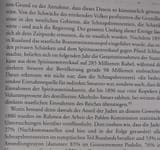>>512785283
>>512785774
From 200 years together:
There is no reason to assume that this existence was so miserable. The weakness of the drinking population benefited the landowners in the western regions, the distillers, the tavern owners - and also the government. The total extent of these revenues can be measured from the moment they became state-owned. After the state monopoly on spirits was introduced in Russia in 1895, which put an end to private taverns and the sale of spirits against collateral, the total revenue of the state treasury from the sale of spirits in the following year amounted to 285 million rubles, while the direct taxes from the population brought in only 98 million. This shows us not only that distilling was "the most significant source of revenue for indirect taxes," but also that the revenues from the spirits industry, which until 1896 only paid "four kopecks per volume percent of distilled alcohol," far exceeded the direct state revenues of the empire.
What was the share of Jews in this trade at that time? In 1886, statistical investigations regarding this were published as part of the work of the Pahlen Commission. There we see that Jews owned 27% (decimal places are rounded here and in the following) of all distilleries in the European part of Russia and 53% in the settlement area (including: 83% in the Podolia Governorate, 76% in...
